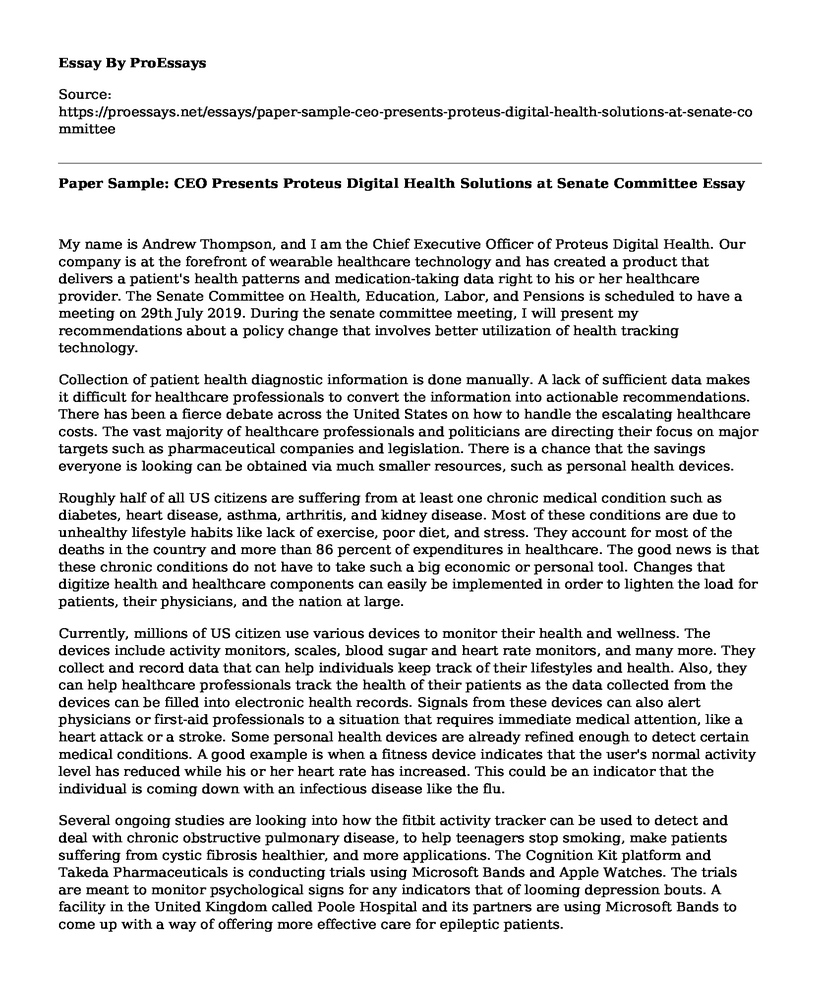My name is Andrew Thompson, and I am the Chief Executive Officer of Proteus Digital Health. Our company is at the forefront of wearable healthcare technology and has created a product that delivers a patient's health patterns and medication-taking data right to his or her healthcare provider. The Senate Committee on Health, Education, Labor, and Pensions is scheduled to have a meeting on 29th July 2019. During the senate committee meeting, I will present my recommendations about a policy change that involves better utilization of health tracking technology.
Collection of patient health diagnostic information is done manually. A lack of sufficient data makes it difficult for healthcare professionals to convert the information into actionable recommendations. There has been a fierce debate across the United States on how to handle the escalating healthcare costs. The vast majority of healthcare professionals and politicians are directing their focus on major targets such as pharmaceutical companies and legislation. There is a chance that the savings everyone is looking can be obtained via much smaller resources, such as personal health devices.
Roughly half of all US citizens are suffering from at least one chronic medical condition such as diabetes, heart disease, asthma, arthritis, and kidney disease. Most of these conditions are due to unhealthy lifestyle habits like lack of exercise, poor diet, and stress. They account for most of the deaths in the country and more than 86 percent of expenditures in healthcare. The good news is that these chronic conditions do not have to take such a big economic or personal tool. Changes that digitize health and healthcare components can easily be implemented in order to lighten the load for patients, their physicians, and the nation at large.
Currently, millions of US citizen use various devices to monitor their health and wellness. The devices include activity monitors, scales, blood sugar and heart rate monitors, and many more. They collect and record data that can help individuals keep track of their lifestyles and health. Also, they can help healthcare professionals track the health of their patients as the data collected from the devices can be filled into electronic health records. Signals from these devices can also alert physicians or first-aid professionals to a situation that requires immediate medical attention, like a heart attack or a stroke. Some personal health devices are already refined enough to detect certain medical conditions. A good example is when a fitness device indicates that the user's normal activity level has reduced while his or her heart rate has increased. This could be an indicator that the individual is coming down with an infectious disease like the flu.
Several ongoing studies are looking into how the fitbit activity tracker can be used to detect and deal with chronic obstructive pulmonary disease, to help teenagers stop smoking, make patients suffering from cystic fibrosis healthier, and more applications. The Cognition Kit platform and Takeda Pharmaceuticals is conducting trials using Microsoft Bands and Apple Watches. The trials are meant to monitor psychological signs for any indicators that of looming depression bouts. A facility in the United Kingdom called Poole Hospital and its partners are using Microsoft Bands to come up with a way of offering more effective care for epileptic patients.
Many users perceive fitness devices as an enjoyable way of tracking their health performance. They get to compete with friends and pat themselves on the back through positive feedback. Simply put, fitness devices and their related applications can 'gamify' fitness and personal health. All in all, what people consider as fun can be used to help minimize healthcare spending. If those who use personal health devices are offered tangible incentives such as health insurance discounts , it is likely to encourage them to engage in more physical activities. This happens to be among the most effective way of preventing and treating numerous lifestyle-related chronic diseases.
Health insurance companies and employers are already applying this strategy. The Affordable Care Act has a provision that compels employers to offer wellness incentives to staff members funded by insrers. All the employees have to do is wear a pedometer or fitness tracker, or record their physical activities using a fitness app. Some national insurers are already offering incentives like rate discounts and gift cards. A good example is UnitedHealthcare that offers about $4 to employees subscribed to its plans if they meet specified daily walking goals.
Conclusion
I recommend that the US Department of Health and Human Services adopts a policy that brings together health diagnostic hardware and utilize the software to create simple health reports for physicians. Patients should be equipped with devices that specifically keep tabs on any health data that is relevant to their medical condition. The data is then uploaded to the cloud whereby software analyses and presents any trends observed to healthcare professionals. A good example of how this would work involves diabetics, most of whom manually take their own blood sugar samples on a daily basis. The readings of many such samples simply disappear. Alternatively, that data could be retrieved, stored in the cloud, and sent to the patient's doctor. The bigger picture down the road involves using the health data to figure out trends as well as adverse medical events before they actually happen.
Cite this page
Paper Sample: CEO Presents Proteus Digital Health Solutions at Senate Committee. (2023, Jan 29). Retrieved from https://proessays.net/essays/paper-sample-ceo-presents-proteus-digital-health-solutions-at-senate-committee
If you are the original author of this essay and no longer wish to have it published on the ProEssays website, please click below to request its removal:
- Empowering of Older People
- Essay Example - The Social Model of Disability
- Population, Health Behavior, and Underlying Reasons for the Behavior
- Article Analysis Essay on Theory of Human Becoming
- Argumentative Essay Sample on Abortion and Health
- Paper Example on IT Management: Concepts & Services
- Paper Example on Technology, Digitization, and Productivity: A Guide







